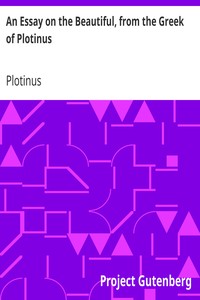An Essay on the Beautiful, from the Greek of Plotinus by Plotinus
"An Essay on the Beautiful, from the Greek of Plotinus" by Plotinus is a philosophical treatise likely written in the late 3rd century AD, focusing on beauty's nature and its connection to the divine and the soul. This book attempts to explore and define beauty, delving deeply into metaphysical concepts aligned with Platonic philosophy. It examines how beauty manifests in both the physical world and the higher realms of intellect and virtue.
The essay argues that beauty exists on different levels, from physical beauty perceived by the senses to a transcendent beauty that the intellect can comprehend. Plotinus asserts that true beauty is linked to the divine source of all good and that the soul, through its purity and virtues, can ascend toward this ultimate beauty. The text contrasts superficial perceptions of beauty with deeper philosophical insights and emphasizes the importance of inner reflection and purification to recognize true beauty. It advocates a return to the essence of beauty within oneself, suggesting that the pursuit of loveliness should lead one toward the divine rather than material forms. This approach to beauty, as combined with the philosophical inquiry into its nature, illustrates Plotinus's view that beauty is a pathway to understanding the eternal truths of existence. (This is an automatically generated summary.)
Read or download for free
| Reading Options | Url | Size | |||
|---|---|---|---|---|---|
| Read now! | https://www.gutenberg.org/ebooks/29510.html.images | 79 kB | |||
| EPUB3 (E-readers incl. Send-to-Kindle) | https://www.gutenberg.org/ebooks/29510.epub3.images | 107 kB | |||
| EPUB (older E-readers) | https://www.gutenberg.org/ebooks/29510.epub.images | 106 kB | |||
| EPUB (no images, older E-readers) | https://www.gutenberg.org/ebooks/29510.epub.noimages | 87 kB | |||
| Kindle | https://www.gutenberg.org/ebooks/29510.kf8.images | 239 kB | |||
| older Kindles | https://www.gutenberg.org/ebooks/29510.kindle.images | 231 kB | |||
| Plain Text UTF-8 | https://www.gutenberg.org/ebooks/29510.txt.utf-8 | 72 kB | |||
| Download HTML (zip) | https://www.gutenberg.org/cache/epub/29510/pg29510-h.zip | 105 kB | |||
| There may be more files related to this item. | |||||
Similar Books
About this eBook
| Author | Plotinus, 205?-270 |
|---|---|
| Translator | Taylor, Thomas, 1758-1835 |
| LoC No. | 17016725 |
| Title | An Essay on the Beautiful, from the Greek of Plotinus |
| Credits | Produced by Ruth Hart |
| Reading Level | Reading ease score: 45.1 (College-level). Difficult to read. |
| Language | English |
| LoC Class | BH: Philosophy, Psychology, Religion: Aesthetics |
| Subject | Aesthetics -- Early works to 1800 |
| Category | Text |
| EBook-No. | 29510 |
| Release Date | Jul 25, 2009 |
| Most Recently Updated | Jan 5, 2021 |
| Copyright Status | Public domain in the USA. |
| Downloads | 626 downloads in the last 30 days. |
| Project Gutenberg eBooks are always free! | |

